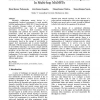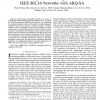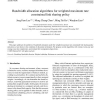108
click to vote
TON
2010
14 years 8 months ago
2010
When heterogeneous congestion control protocols that react to different pricing signals share the same network, the current theory based on utility maximization fails to predict th...
129
click to vote
IJACTAICIT
2010
14 years 11 months ago
2010
In recent past, cognitive radio has come out to as a promising solution to the spectrum scarcity problem. It tends to increase the spectrum utilization by making use of underutili...
212
click to vote
CORR
2010
Springer
14 years 11 months ago
2010
Springer
Electronic collaboration among devices in a geographically localized environment is made possible with the implementation of IEEE 802.11 based wireless ad hoc networks. Dynamic na...
139
click to vote
GLOBECOM
2010
IEEE
15 years 1 days ago
2010
IEEE
Bandwidth allocation for different service classes in heterogeneous wireless networks is an important issue for service provider in terms of balancing service quality and profit. I...
141
click to vote
TMC
2010
15 years 12 days ago
2010
—In wireless networks, node cooperation has been exploited as a data relaying mechanism for decades. However, the wireless channel allows for much richer interaction among nodes....
133
click to vote
TON
1998
15 years 1 months ago
1998
— This paper presents the “allocated-capacity” framework for providing different levels of best-effort service in times of network congestion. The “allocatedcapacity” fra...
124
click to vote
NGC
2002
Springer
15 years 1 months ago
2002
Springer
In this paper we aim at developing a solution to fairly allocating bandwidth among unicast and multicast flows. For this purpose, we propose the anycast max-min fairness criterion,...
146
click to vote
COMCOM
2004
15 years 1 months ago
2004
A flexible bandwidth management scheme namely Bandwidth-based Polling (BBP) for Bluetooth is proposed. A framing structure of time is defined in BBP, and the master allocates prop...
145
click to vote
TWC
2008
15 years 1 months ago
2008
In this paper, bandwidth allocation, in terms of distributing available data slots among different users, is studied for QoS provisioning in IEEE 802.16 networks. By considering th...
115
click to vote
IPL
2006
15 years 2 months ago
2006
This paper addresses the problem of bandwidth allocation under the weighted maximum rate constrained link sharing policy and proves a key theory in the condition of allocation ter...



